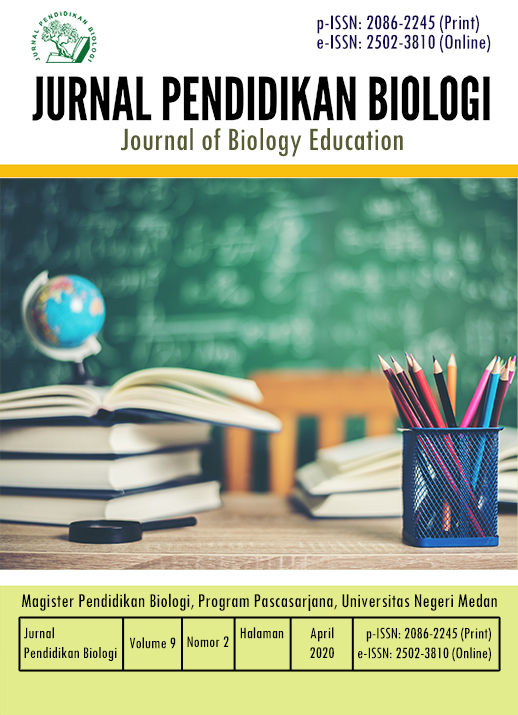Capaian Aspek Kompetensi Sains Siswa SMA dengan Pembelajaran Model Problem-Based Learning dan Cooperative Learning Tipe STAD
DOI:
https://doi.org/10.24114/jpb.v9i2.14902Keywords:
Problem-based Learning, Cooperative-Learning, Komparasi, Literasi sainsAbstract
Science literacy is an essential element of science and technology learning. The mastery of science literacy drives people being competitive and worth employed, especially in the workplace where an employee is expected to be innovative. Globally the mastery of society's science literacy of Indonesian students was still low. Science literacy consists of 4 dimensions, namely context, science competence, knowledge, and science attitude. The science competency dimension becomes important to be achieved by the students as an indicator of the achievement of science literacy. Related to improving science literacy through components of learning strategy, based on various relevant research, in SMA Negeri 1 Tanjungpinang has been conducted a study to compare the achievement of science competency with Problem-based learning and Cooperative Learning (STAD type). To test whether there is a significant difference in the average level of science competency scores between the PBL class and the CL-STAD class in SMA 1 used Mann-Whitney test which shows a significant value of 0.000 < 0.05. These results show that there is a significant difference in the average level of science competency of the students X IPA class with the implementation of the PBL and CL-STAD in SMA 1 Tanjungpinang. The achievement of science competency in PBL class is higher than the achievement in CL-STAD class based on 3 aspects, namely: identifying scientific issues, explaining scientific phenomena, and using scientific evidence.References
Aryulina, D. dan Riyanto. (2016). A Problem-based Learning Model In Biology Education Courses to Develop Inquiry Teaching Competency of Preservice Teachers. Cakrawala Pendidikan, 35 (1), 47-57.
Fauzan, M., Gani, A., & Syukri, M. (2017). Penerapan Model Problem Based Learning Pada Pembelajaran Materi Sistem Tata Surya Untuk Meningkatkan Hasil Belajar Peserta Didik. Jurnal Pendidikan Sains Indonesia, 5 (1), 27-35. https://doi.org/10.15713/ins.mmj.3
Finneran, M. L. (2017). Improving Scientific Literacy through Reading Strategies: An Action Research Study Doctoral dissertation. Retrieved from https://scholarcommons.sc.edu/etd/4346
Grant, M., & Fisher, D. (2011). Teaching Science Literacy. Publication of Educational Leadership, 68 (6). Retrieved from http://www.ascd.org/publications/educational-leadership/mar11/vol68/num06/Teaching-Science-Literacy.aspx
Heller, M. (2005). Topic of interest-Scientific literacy in Latin America: How are we doing? Educational Portal of the Americas. Retrieved from https://www.educoas.org/Portal/en/tema/tinteres/temaint55.aspx?culture=en&navid=36.
McDonald, J; & Dominguez, L. (2005). Moving from Content Knowledge to Engagement. Journal of College ScienceTeaching, 35(3), 18-22. Retrieved from https://www.questia.com/read/1G1-138661833/moving-from-content-knowledge-to-engagement
McPhearson, P.T.; Pollack, G.R.; and Sable, J.E. (2008). Increasing Scientific Literacy in Undergraduate Education: A Case Study from œFrontiers of Science at Columbia University. Retrieved from https://www.biology.columbia.edu/people/pollack
OECD. (2013). PISA 2012 Assessment and Analytical Framework: Mathematics, Reading, Science, Problem Solving and Financial Literacy, OECD Publishing. http://dx.doi.org/10.1787/9789264190511-en.
Ogunkola, B. J. (2013). Scientific Literacy: Conceptual Overview, Importance and Strategies for Improvement. Journal of Educationai and Sociai Research, 3 (1), 265-274. https://doi.org/10.5901/jesr.2013.v3n1p265
Scleicher, A. (2019). PISA 2018; Insight and Interpretation. OECD. Retrieved from https://www.oecd.org/pisa/PISA%202018%20Insights%20and%20Interpretations%20FINAL%20PDF.pdf
Strobel, J., & van Barneveld, A. (2009). When is PBL More Effective? A Meta-synthesis of Meta-analyses Comparing PBL to Conventional Classrooms. Interdisciplinary Journal of Problem-Based Learning, 3(1), 45-58. https://doi.org/10.7771/1541-5015.1046
Sugiyono. (2017). Metode Penelitian Kuantitatif, Kualitatif, dan R&D. Bandung: Alfabeta, CV.
Wood, E. J. (2004). Problem-Based Learning: Exploiting Knowledge of how People Learn to Promote Effective Learning. Bioscience Education, 3(1), 1-12. https://doi.org/10.3108/beej.2004.03000006
Downloads
Published
Issue
Section
License
Copyright (c) 2020 Jurnal Pendidikan Biologi

This work is licensed under a Creative Commons Attribution 4.0 International License.
Copyright
Penyerahan naskah menyiratkan bahwa karya yang diserahkan belum pernah diterbitkan sebelumnya (kecuali sebagai bagian dari tesis, laporan, atau abstrak). Naskah tidak dipertimbangkan untuk publikasi di tempat lain. Penerbitannya telah disetujui oleh semua penulis bersama. Jika dan kapan naskah diterima untuk publikasi, penulis masih memegang hak cipta dan mempertahankan hak penerbitan tanpa batasan. Penulis atau orang lain diperbolehkan untuk melipatgandakan artikel selama tidak untuk tujuan komersial. Untuk penemuan baru, penulis disarankan untuk mengelola patennya sebelum diterbitkan.
Open Access
Jurnal ini berkomitmen untuk membuka akses bebas yang tidak membebankan biaya kepada pembacanya atau lembaga mereka. Pembaca berhak membaca, mengunduh, menyalin, mendistribusikan, mencetak, mencari, atau menautkan ke teks lengkap artikel, selama tidak untuk tujuan komersial. Jenis lisensi adalah CC-BY-4.0.
Disclaimer
Tidak ada tanggung jawab yang dikenakan kepada Penerbit atau oleh editor untuk kesalahan dan/atau kerusakan pada naskah sebagai akibat dari pernyataan pencemaran nama baik atau dugaan pencemaran nama baik, pelanggaran hak kekayaan intelektual atau privasi, atau kewajiban produk, baik akibat kelalaian atau sebaliknya, atau dari penggunaan atau operasi ide, instruksi, prosedur, produk atau metode apa pun yang terkandung dalam materi di dalamnya.

